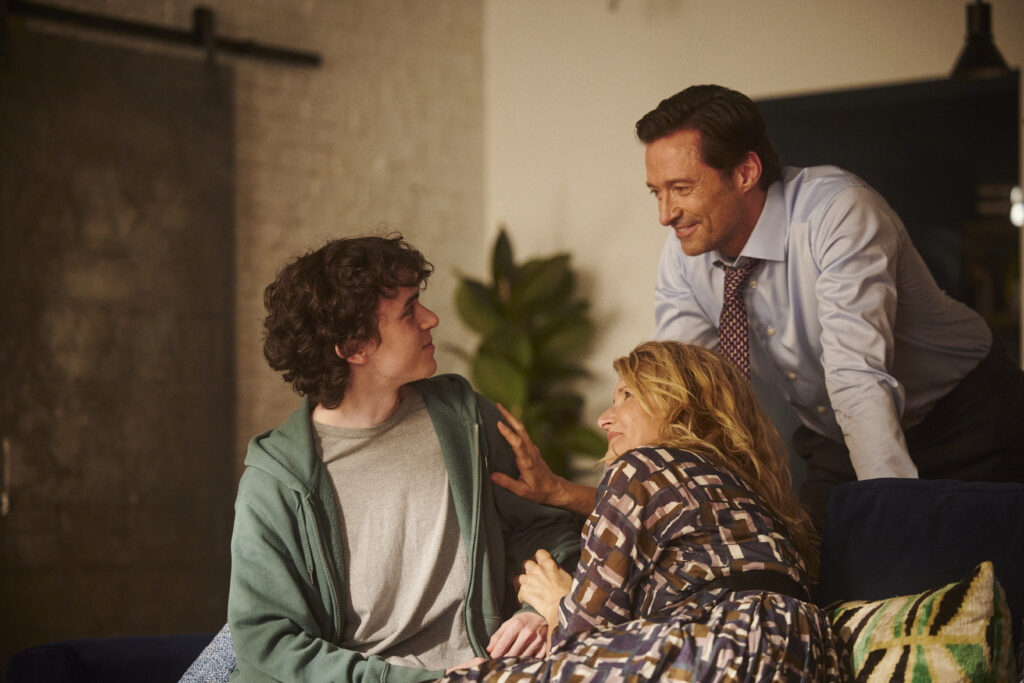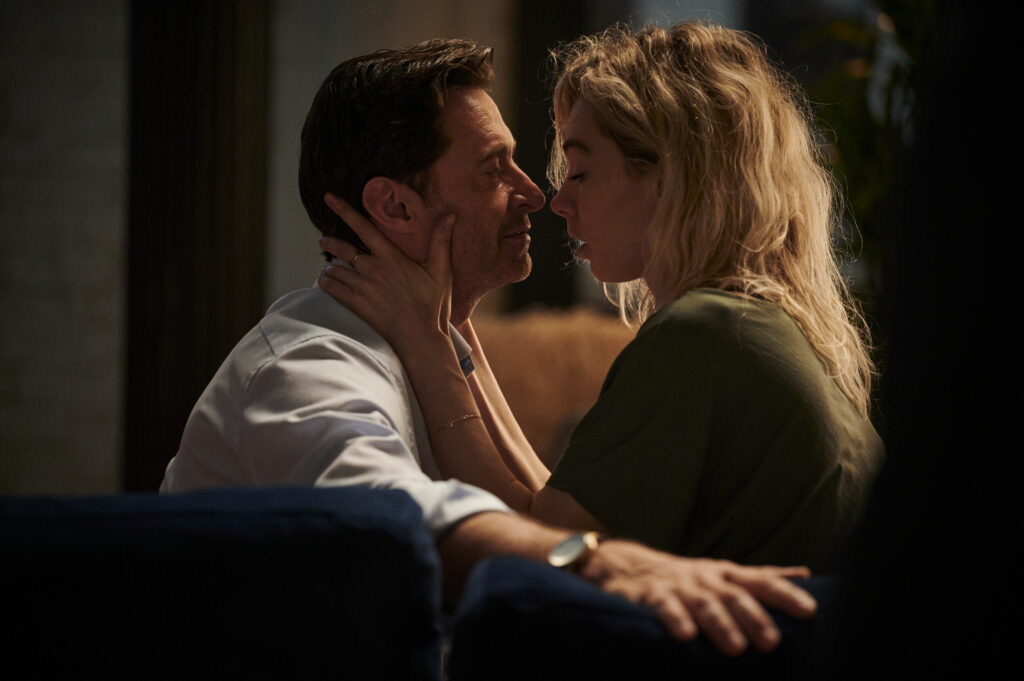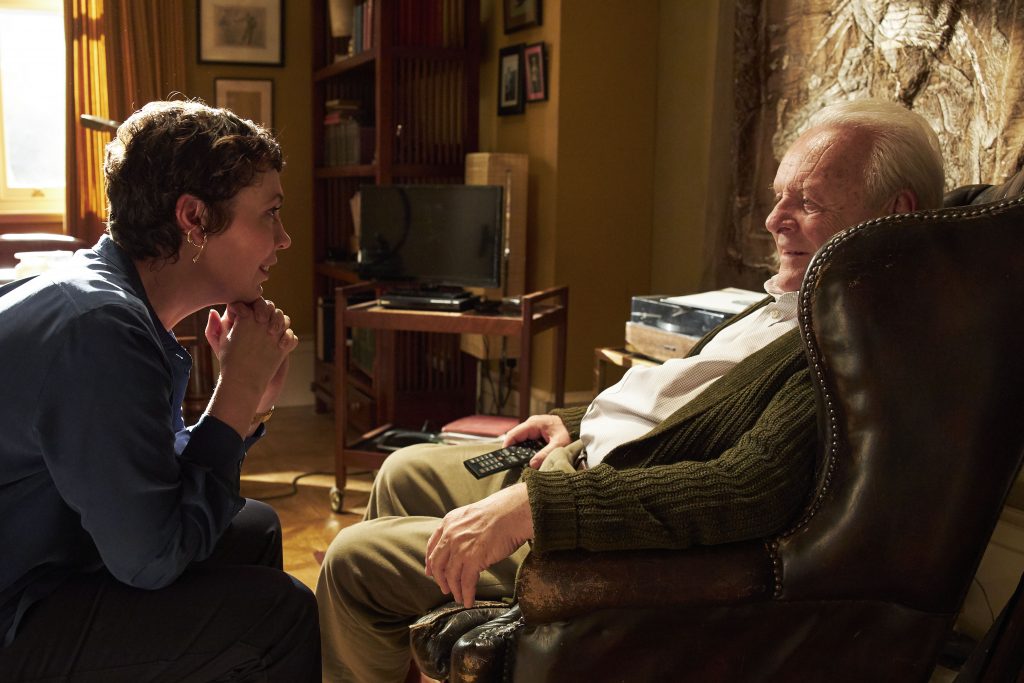December 10, 2022
by Carla Hay

Directed by Florian Zeller
Culture Representation: Taking place primarily in New York City and briefly in Washington, D.C., the dramatic film “The Son” has a predominantly white cast of characters (with some African Americans and Asians) representing the working-class, middle-class and wealthy.
Culture Clash: A workaholic corporate lawyer, his ex-wife and his current wife struggle with understanding the depression of his 17-year-old son from his first marriage.
Culture Audience: “The Son” will appeal primarily to people who are fans of the movie’s stars and don’t mind watching movies about mental illness that awkwardly handle this serious subject matter.

A talented cast can’t save “The Son,” a sloppily edited drama that mishandles issues about mental illness in a turgid and manipulative way. This is writer/director Florian Zeller’s sophomore slump as a feature filmmaker. Zeller triumphed with his feature-film directorial debut “The Father,” his stellar 2020 drama for which he and co-writer Christopher Hampton won an Oscar for Best Adapted Screenplay. “The Father,” which is based on Zeller’s play of the same name, is a story told from the perspective of an elderly British man who has dementia. Anthony Hopkins portrayed the person with dementia in the “The Father,” and Hopkins won an Oscar for Best Actor for this performance.
Zeller brought Hopkins in for a short scene (which lasts less than 10 minutes) in “The Son,” and this scene is one of the highlights of this very uneven and ultimately disappointing movie. “The Father” and “The Son” are not similar to each other all, except for the fact that both movies are based on Zeller’s stage plays of the same names, and both movies are about families coping with a loved one who has a mental illness. The title character in each movie is the one dealing with the mental health issues.
Zeller and Hampton teamed up again to co-write “The Son” screenplay. “The Son” had its world premiere at the 2022 Venice International Film Festival. It also made the rounds at several other film festivals in 2022, including the Toronto International Film Festival, the BFI London Film Festival and AFI Fest in Los Angeles. Being at these high-profile festivals might seem like the “The Son” is a “prestige picture,” but it’s more indicative of the movie’s star power than the quality of the film. “The Son’s” clumsy treatment of a complicated issues such as depression is a lot like what you would see on a TV-movie made for a basic cable network.
“The Son” covers a well-worn topic that’s been the subject of numerous movies and TV shows: A workaholic father’s absence from home ends up causing resentment from some of his family members, and he might spend the rest of the story trying to mend any broken relationships caused by his lack of attention to his family. Arguments, grudges and sometimes physical altercations then happen. And then, depending on how predictable the story wants to be, a truce is usually called and people go on a path toward healing.
“The Father” was told from the perspective of the title character, but “The Son” is not told from the perspective of the title character. Instead, “The Son” puts most of its efforts in showing the thoughts and feelings of the son’s father. Up until a certain point in the movie, “The Son” is a formulaic story of a family damaged by divorce and not knowing how to deal with mental illness. But perhaps in a misguided effort to not have a typical ending, “The Son” does something so off-putting in the film’s last 15 minutes, it essentially ruins the movie.
In “The Son,” Peter Miller (played by Hugh Jackman) is an ambitious attorney who works at a corporate firm in New York City. Viewers will soon see that Peter (who is in his 50s) is highly motivated to succeed, and he expects excellence from himself and everyone around him. Peter lives in an upscale New York City apartment with his second wife Beth (played by Vanessa Kirby), who’s about 20 years younger than Peter. Beth and Peter, who’ve been married for less than two years, are parents of an infant son named Theo (played by twins Felix Goddard and Max Goddard).
Conversations in the movie reveal that Beth and Peter had an affair while he was still married to his first wife Kate (played by Laura Dern), who was devastated when Peter left Kate to be with Beth. Peter and Beth met (ironically enough) at a wedding, and Beth knew from the beginning that Peter was married. Peter and Kate have a 17-year-old son named Nicholas (played by Zen McGrath), who is also emotionally wounded from his parents’ divorce. Kate has full custody of Nicholas, who lives with her in New York City.
Peter will soon find out how much Nicholas has resentment toward him and how depressed Nicholas is. It starts with a worried phone call from Kate, who tells Peter that she recently found out that Nicholas stopped going to school for almost a month. Nicholas pretended to her that he was going to school, but he was actually just spending time walking around the city, according to what he confesses later. When the school tried to contact Kate by phone and by email about Nicholas’ absence, Nicholas was able to intercept those messages until the truth came out.
Kate also tells Peter that she and Nicholas no longer get along with each other. “He’s not well,” Kate insists. Kate also ominously hints to Peter that Nicholas could be dangerous. She describes how Nicholas once looked at her with so much hatred, she thought he might physically hurt her. “He scares me, okay?” Kate says to Peter about Nicholas.
It’s reached a point where Kate (who feels helpless and confused) has reluctantly agreed to Nicholas’ request to live with Peter for the time being. Nicholas tells Peter why he wants to live with him when he describes how he fells about living with Kate: “When I’m here, I get too many dark ideas. I want to live with my little brother. Sometimes, I feel like I’m going crazy.”
Peter’s way of handling Nicholas’ problems is to try to find a logical solution. Peter tries to be understanding, but he often talks to Nicholas like a prosecutor interrogating a defense witness in court. At this point, Peter isn’t fully aware that Nicholas has a mental illness. Peter thinks Nicholas is just being a rebellious brat.
In one of the movie’s several emotionally charged conversations, Peter demands that Nicholas tell him what’s wrong. On the verge of tears, Nicholas tries to explain to Peter why he’s been skipping school: “I don’t know how to describe it. It’s life. It’s weighing me down.”
Peter tells Beth what’s going on with Nicholas and asks her if it will be okay if Nicholas lives with them for a while, even though it’s obvious that Peter has made up his mind that Nicholas will live with them. Kate and Peter also agree that Nicholas (a loner who has difficulty making friends) can transfer to another school. What they don’t do is try to get him into therapy. Peter is the type of person who thinks the family can solve this problem on their own.
At first, Beth is reluctant to have this troubled teen living with them when she’s already busy taking care of a newborn child. However, Beth agrees to let Nicholas live with them (they have an extra bedroom that Nicholas will have to himself) because she sees how much Peter wants to help Nicholas, and she doesn’t want to interfere in this father-son relationship. Beth has only known Nicholas for two years, so she feels she doesn’t have the right to make parental decisions about him.
The rest of “The Son” is a back-and-forth repetition of Nicholas seeming to improve while living with Peter and Beth, but then something happens to show that Nicholas is not doing very well at all. Eventually, Peter finds out that Nicholas self-harms by cutting himself. Peter and Kate go through various stages of denial, guilt, sadness and anger, while Beth has her guard up and doesn’t really want to deal with the family problems when they get too intense. Beth also has stepparent insecurities about how much a spouse cares about any children from a previous marriage, compared to how much the spouse cares about any children from the current marriage.
“The Son” has a not-very-interesting subplot about Peter getting a job offer to work for a U.S. senator from Delaware named Brian Hammer (played by Joseph Mydell), who wants to hire Peter for Senator Hammer’s re-election campaign. The job would require Peter to spend a lot of time in Washington, D.C., so Peter has to decide whether or not to take the job in the midst of all of his family problems. “The Son” uses this subplot as a way try to create some suspense over whether not Peter will accept this job offer. This decision isn’t as suspenseful as the movie wants it to be.
The Washington, D.C., area is also where Peter’s unnamed widower father (played by Hopkins) lives, so there’s a gripping scene where Peter visits his father while Peter is in the area to meet with Senator Hammer. It’s in this scene where viewers find out more about Peter’s family background and why Peter has the parenting style that he does. Even though Peter doesn’t want to admit it, he’s a lot like his father, when it comes to letting work get in the way of spending quality time with his family.
But unlike Peter, his father is cold, cruel and unapologetic for making work a higher priority than his family. Peter tells his father that Nicholas is now living with Peter, and this new living arrangement seems to be helping Nicholas with Nicholas’ problems. Instead of being concerned or empathetic about Nicholas, Peter’s father accuses Peter of telling him this information to make Peter look like a better father.
Peter denies it, of course. This unfair and paranoid accusation stirs up some deep-seated resentments, and Peter reminds his father how selfish he was not to visit Peter’s mother when she was dying in the hospital. Peter’s father responds this way: “Just fucking get over it.” Even though Hopkins has a standout scene in “The Son,” too many other scenes in the film are mired in predictability.
“The Son” puts so much emphasis on Peter, he’s the only main character who gets a backstory. The movie reveals nothing about the backgrounds of Kate and Beth, even though Kate has been Nicholas’ primary caretaking parent after the divorce, up until Nicholas began living with Peter and Beth. Viewers will never find out how Kate’s own upbringing affected her parenting skills.
The movie also gives no information about Nicholas’ background to indicate how long he’s been having these feelings of depression. Several times in the movie, Nicholas tells Peter that he blames Peter’s abandonment and the divorce for feeling depressed, but it all seems too convenient and intended to put Peter on a guilt trip. If Peter had been too busy with work to notice Nicholas’ problems, then what indications did Kate see? Don’t expect the movie to answer that question.
Instead, the most that viewers will see about Nicholas before he moved in with Peter are several cutesy flashbacks of a 6-year-old Nicholas (played by George Cobell) in happier times during a vacation that he took with his parents in Corsica. “The Son” keeps showing flashbacks of this family of three taking a trip on a small boat, and Peter teaching an adorable Nicholas how to swim in the sea. These superficial flashbacks are examples of lazy storytelling that doesn’t give viewers a chance to get to know Nicholas as a well-rounded person.
“The Son” gives no information about what Nicholas’ personality was like a few years before the divorce. It’s possible that he had depression when his parents were still married, but that information is never revealed or discussed in the movie. “The Son” brings up a lot of questions about Nicholas that the movie never answers. It’s a huge misstep in how this movie portrays its title character.
Considering these limitations, McGrath gives a compelling but not outstanding performance as Nicholas. A few times in the movie, Nicholas is described as looking “evil,” but the expression on his face just looks like he’s pouting and glaring like a spoiled child who didn’t get his way. People with enough life experience can see that Nicholas has depression problems, but he’s also very manipulative, and he knows how to make his parents (especially Peter) feel guilty about the divorce.
As for the other principal cast members, Dern gives an authentic performance for her underdeveloped Kate character when expressing the anguish of a parent who goes through what Kate goes through in the movie. Kirby gives some depth to what is essentially a “trophy wife” role, but so little is known about Beth, there’s only so much that Kirby can do with this often-aloof character. Beth also complains to Peter about how he spends more time at work than at home, which kind of makes her look like a ditz that she didn’t know he was a workaholic when she married him.
Ultimately, “The Son” comes across as a showboat movie for Jackman, because it spends so much time showing Peter’s life outside the home, as well as Peter’s feelings about his own “daddy issues.” Peter is supposed to be American, but Jackman’s native Australian accent can sometimes be heard in his performance of Peter, especially in scenes where Peter is shouting or arguing with someone. Jackman certainly delivers a heartfelt performance, but a lot of it seems overly calculated too, much like how the movie handles the most sensitive scenes.
Unfortunately, “The Son” has much bigger problems than actors trying too hard to be noticed in obvious “awards bait” roles. The movie’s editing is haphazard and sometimes baffling. For example, there’s a scene that’s interrupted by a five-second flashback of Peter and 6-year-old Nicholas frolicking in the water on that vacation. This brief flashback is so random and out-of-place, it makes you wonder why Zeller made such amateurish editing decisions for “The Son” when “The Father” was so brilliantly edited.
The last 15 minutes of “The Son” are what will really turn off viewers the most. The way the story ends is gimmicky and could easily be interpreted as crass exploitation, for the sake of having a “surprise” plot twist. If “The Son” intended to be respectful of people who deal with the same issues as the ones portrayed in this substandard movie, then “The Son” torpedoed any good will by conjuring up a truly awful ending that cannot be redeemed.
Sony Pictures Classics released “The Son” in select U.S. cinemas on November 25, 2022, with an expansion to more U.S. cinemas on December 16, 2022, and on January 20, 2023.


